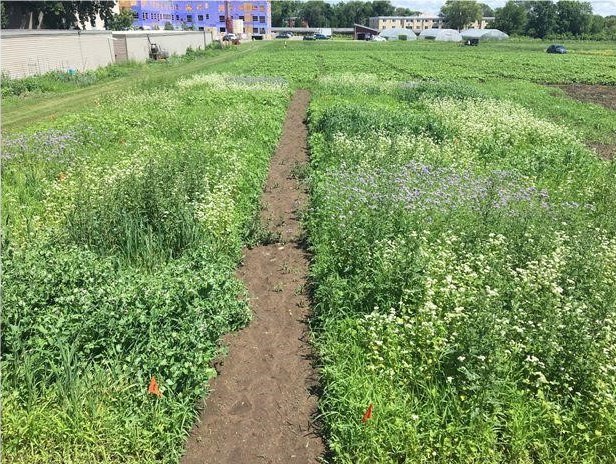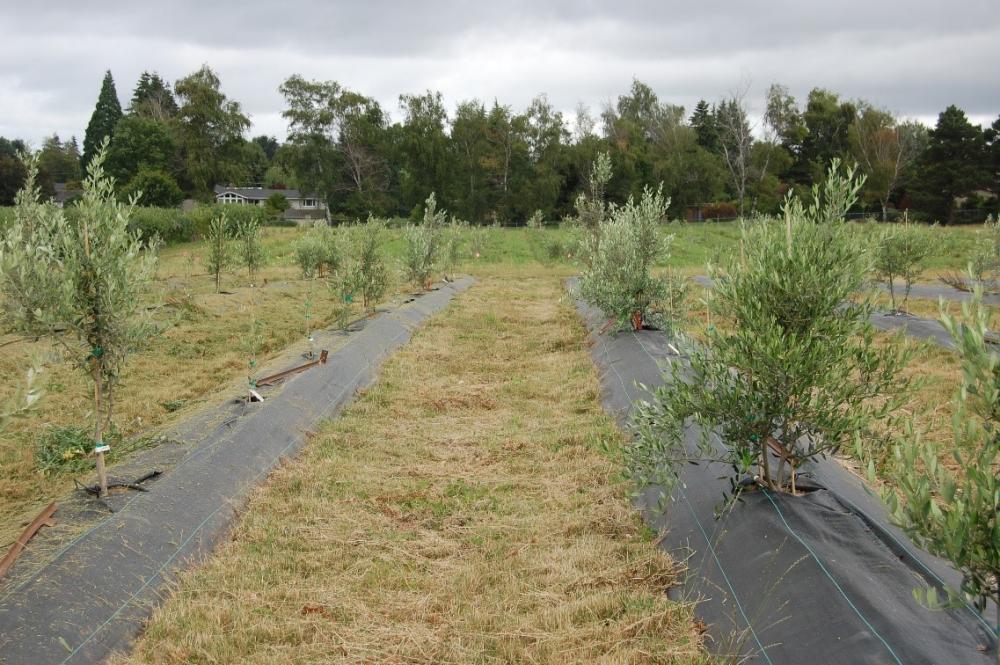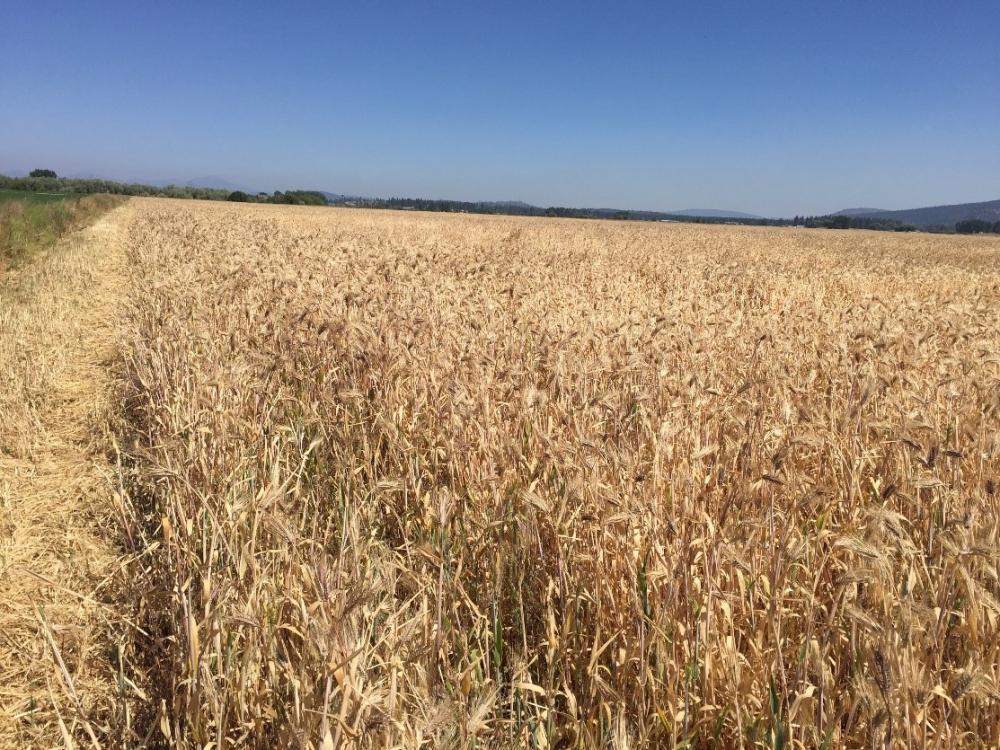Read this newsletter online here
New eOrganic articles
Read these new articles on summer cover crop benefits, organic olives in Oregon, and organic naked barley costs and benefits. Find these and all our articles on organic farming and research at http://eorganic.org/
 Summer Cover Crop Options for Organic Vegetable Farms in the Upper Midwest, by Naomy Candelaria, Julie Grossman, Adria Fernandez and Mary Rogers of the University of Minnesota, and Anne Pfeiffer of the University of Wisconsin. Read the article at https://eorganic.org/node/34375
Summer Cover Crop Options for Organic Vegetable Farms in the Upper Midwest, by Naomy Candelaria, Julie Grossman, Adria Fernandez and Mary Rogers of the University of Minnesota, and Anne Pfeiffer of the University of Wisconsin. Read the article at https://eorganic.org/node/34375
 Initial Considerations for Establishing Small-Scale Organic Olive Orchards in the Pacific Northwest West of the Cascades, by Tessa Barker, Javier Fernandez-Salvador, Neil Bell and Heather Stoven of Oregon State University. Read the article at https://eorganic.org/node/34189
Initial Considerations for Establishing Small-Scale Organic Olive Orchards in the Pacific Northwest West of the Cascades, by Tessa Barker, Javier Fernandez-Salvador, Neil Bell and Heather Stoven of Oregon State University. Read the article at https://eorganic.org/node/34189
 Organic and Naked (Hull-less) Barley: Practices, Production Costs, and Benefits, by Brian Baker, Brigid Meints, and Patrick Hayes of Oregon State University. Read the article at https://eorganic.org/node/34371
Organic and Naked (Hull-less) Barley: Practices, Production Costs, and Benefits, by Brian Baker, Brigid Meints, and Patrick Hayes of Oregon State University. Read the article at https://eorganic.org/node/34371
February 5: New Webinar on Breeding Biofortified Field Pea and Sorghum for Organic Plant-Based Proteins
Pulse crops such as field peas, as well as ancient cereal grains like sorghum, show great potential to meet the increasing consumer demand for organic plant-based protein, prebiotic carbohydrates, and essential micronutrients, especially within allergen- and gluten-free markets. Yet, very little cultivar development has been done to optimize the genetics of field pea and sorghum to maximize productivity and profitability for growers and also improve nutritional quality for end-users and consumers. This webinar will highlight the ongoing development of organic field pea and sorghum cultivars with improved nutrient composition using on-farm field selection. The talk will also provide a brief insight into the advanced technologies being used for cultivar development. Last but not least, we will discuss organic management practices used to produce these crops in both nutrient-rich (Clemson, SC) and marginal (Pelion, SC) soils. This webinar is structured to be an informative, learning opportunity for current and prospective organic growers, as well as researchers, scientists, and students interested in organic cultivar development and management. Presented by Dil Thavarajah, Rick Boyles, Ben Dubard and Tristan Lawrence of Clemson University. Register here and register for all our upcoming webinars at the links below.
| Upcoming Webinars | Presenters | Date |
|---|---|---|
| Reducing Production Risks through Organic Soil Health Practices for the South | Mark Schonbeck, Organic Farming Research Foundation; Emily Oakley, Three Springs Farm, Rose, OK. | January 13, 2021 |
| Biological Control Options in Vegetable Production | JC Chong, Gunbharpur Singh Gill, Clemson University | February 3, 2021 |
| Going Organic: Breeding Biofortified Field Pea and Sorghum | Dil Thavarajah and team, Clemson University | February 5, 2021 |
| Insect-vectored Viruses and Their Management in Vegetables | Babu Srinivasan, Bhabesh Dutta and Timothy Coolong, University of Georgia | February 10, 2021 |
| Biological Control of Whiteflies in Squash | Oscar Lilburd and Lorena Lopez, University of Florida | February 24, 2021 |
| Incorporating Biological Control of Spider Mites into Tomato Pest Management Programs | Jim Walgenbach and Tom Bilbo, NC State University | March 1, 2021 |
Organic Dairy Research Needs, Market Outlook and the State of the Organic Dairy Industry
The Organic Dairy Systems Summit was held on December 8th, and recordings are now available. The event was organized by members of a NIFA OREI research project led by Martin Wiedmann of Cornell University: A Systems Approach To Improve Quality and Shelf Life of Organic Dairy Products for Domestic and Export Markets. Presenters included Steve Smith of NIFA, who discussed organic dairy research needs and priorities; Sarah Flicken of NOFA-NY who reported on the state of the organic dairy industry; Ryan Coory of Mercaris, who presented a market outlook on organic dairy in the U.S., and roundtables of producers, processors and retailers. Find the recordings on the research project website at https://eorganic.info/node/34485, or as a playlist on the eOrganic YouTube channel here.
Learn about Seed Saving, Plant Breeding, Organic Carrot Breeding and Winter Vegetables
Micaela Colley and Laurie McKenzie of the Organic Seed Alliance will be giving three presentations during the Culinary Breeding Network Variety Showcase – one focused on seed saving, another on plant breeding, and a third on the Carrot Improvement for Organic Agriculture (CIOA) project, on February 22, 23 and 24th, respectively. The Variety Showcase is taking place December 1st through March 18th, and this year, the focus is on nine winter vegetables: Celeriac, Radicchio, Brussels Sprouts, Cabbage, Cauliflower, Collards, Winter Squash, Garlic and Purple Sprouting Broccoli. Presentations will explore plant histories, origins and domestication; medicinal, nutritional and culinary elements of species; farm visits; cooking demonstrations; art and folklore. The event is free, and many presentations have been recorded. Learn more and register here.
Field Bindweed Biological Control Consortium Meeting
Field bindweed is one of the most difficult weeds to control in organic systems. On January 14, 2021 at 9AM Mountain Time (8AM Pacific, 10 Central, 11 Eastern) a meeting will be held that wil include speakers from Montana State University and the USDA ARS on existing biological control agents, current biological control development including stem-mining fly and clearwing moth, and genetic reproduction subjects, as well as discussion of the consortium research budget. View a flyer and find a link to join the meeting at http://smallgrains.wsu.edu/event/field-bindweed-biological-control/
Research Updates on Canada Thistle and Bindweed in Montana
Additional presentations and updates on current research on field bindweed and Canada thistle from Montana State University and the USDA ARS can be found on the Montana Organic Association YouTube channel here. Topics include "CREEP STOP: Progress Report on Our Project to Develop Strategies for Suppression of Creeping Perennial Weeds”, “Bioherbicides: How to get them to work effectively against Canada Thistle and Bindweed, in Montana”, and “Canada Thistle Biocontrol in Organic Cropping Systems.” Presenters include Pat Carr, Tim Seipel, David Sands, Chelsey Roper, Jed Eberly, Ole Norgaard, and others.
Listening Session on GMO Contamination
The Organic Seed Alliance (OSA), Friends of Family Farmers, Cultivate Oregon, Our Family Farms, OSU Extension Small Farms Program, Oregonians for Safe Farms and Families, and the National Center for Appropriate Technology (NCAT) will host a listening session to hear from farmers, seed growers, seed companies, plant breeders, and other food and farming stakeholders about issues they face with GMO contamination. The session takes place on January 19th at 12PM Pacific, 1 Mountain, 2 Central, 3 Eastern Time. Find more information and register here.
Virtual Organic Farming Conferences
This year offers unprecedented opportunities to learn about organic farming, agricultural research and social justice from inspiring speakers without the need to travel. Some conferences even include farm tours, movies, or virtual happy hours. Below is an incomplete list of conferences taking place in January and February:
- January 5-February 25: TOFGA (Texas)
- January 8-10: NOFA-MASS
- January 16-23: NOFA-NY
- January 16-24 Northeast Organic Seed Conference
- January 19-February 5: PASA (Pennsylvania)
- January 20-23: EcoFarm Conference
- January 21-23: Practical Farmers of Iowa
- January 30-31: NOFA-NJ
- February 7-March 4: NOFA-VT
- February 10-15: OEFFA
- February 13-14: NOFA-NH
- February 22-27: MOSES Organic Farm Conference
eOrganic Mission and Resources
eOrganic is a web community where organic agriculture farmers, researchers, and educators network; exchange objective, research- and experience-based information; learn together; and communicate regionally, nationally, and internationally. If you have expertise in organic agriculture and would like to develop U.S. certified organic agriculture information, join us at http://eorganic.info
eOrganic Resources
- Find all eOrganic articles, videos and webinars at http://www.eorganic.org
- Connect with eOrganic on Facebook and Twitter and Instagram and subscribe to our YouTube channel!
- Have a question about organic farming? Use the eXtension Ask an Expert service to connect with the eOrganic community to get an answer!




